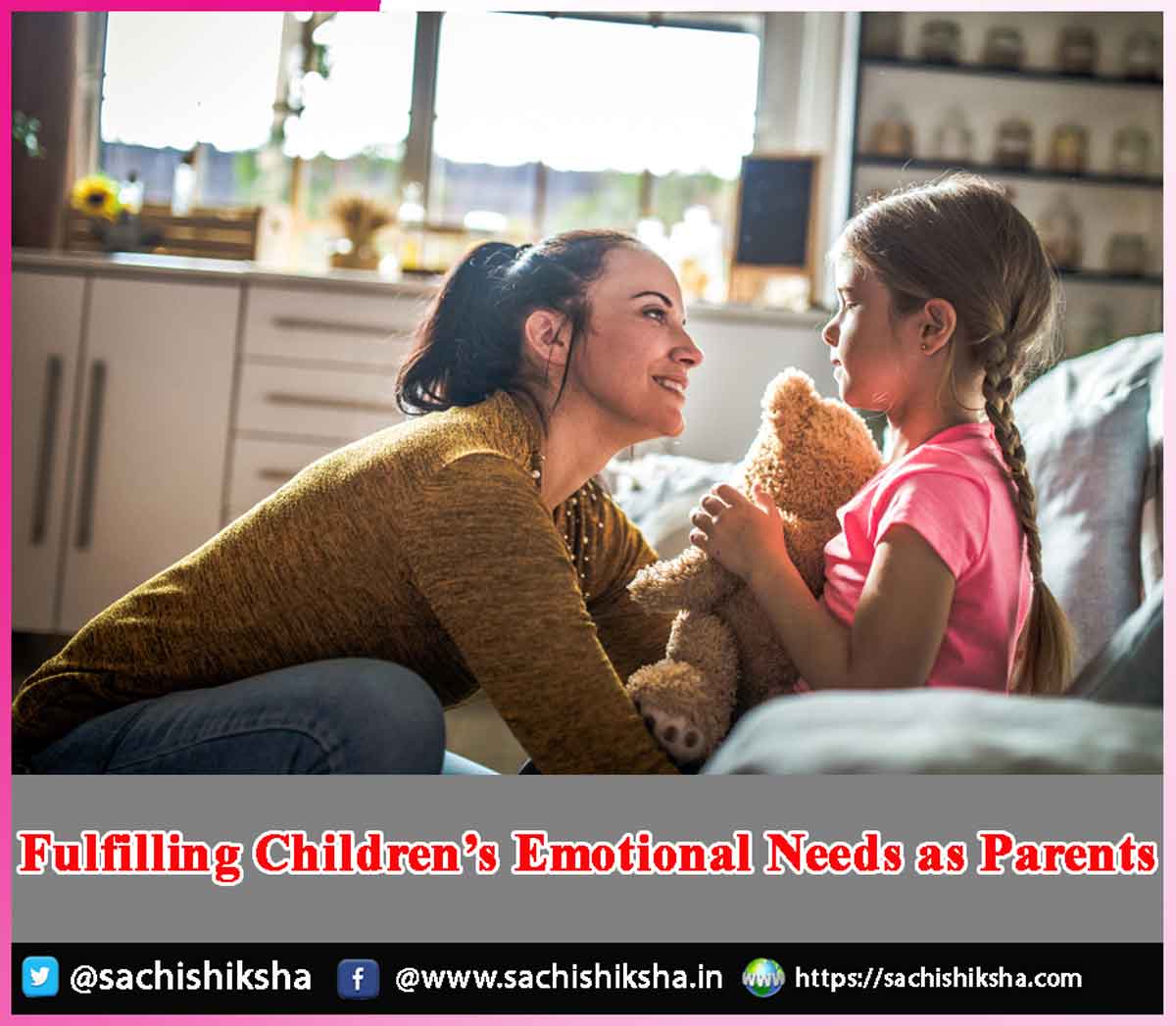Fulfilling Children’s Emotional Needs as Parents
Introduction: Parenting is a deeply rewarding yet challenging journey, particularly when it comes to fulfilling the emotional needs of children. A child’s emotional development plays a critical role in shaping his/her self-esteem, relationships, behavior, and overall well-being.

Table of Contents
The Importance of Fulfilling Emotional Needs
Children are highly impressionable and depend on their parents or caregivers to provide a sense of safety and stability. When a child’s emotional needs are met, they develop a secure attachment to their caregivers, which serves as the foundation for healthy emotional development. This early foundation is crucial for:
- Self-esteem: When children feel loved and valued, they learn to view themselves positively.
- Emotional Regulation: A child who experiences understanding and validation of his/her feelings is more likely to manage emotions effectively.
- Resilience: Fulfilling emotional needs helps children cope with stress and setbacks, building their resilience.
- Social Skills: When children receive emotional support, they develop empathy, cooperation, and strong interpersonal skills.
- Academic Success: Children who feel emotionally supported tend to perform better in school due to increased confidence and a sense of well-being. Neglecting these needs can lead to emotional, psychological, and behavioral issues, such as anxiety, depression, low self-esteem, and difficulty forming healthy relationships.
Key Emotional Needs of Children
- Love and Affection: At the core of emotional development is the need for love and affection. From birth, children require physical affection such as hugging, kissing, and holding, as well as verbal expressions of love. When children feel loved, they experience a sense of worthiness and belonging.
- How to Fulfill This Need: Express love daily, both verbally and physically. For example, saying “I love you” or simply hugging them can be powerful. Be emotionally available. Spend quality time with your child without distractions and show genuine care.
- Security and Stability: Children require a secure atmosphere in which they remain secure and safeguarded. This includes both physical safety (protection from harm or danger) and emotional security (feeling safe from rejection, criticism, or abandonment). Consistency in routines and discipline provides stability, helping children feel more secure. To overcome this challenge, establish predictable routines, such as regular bedtimes, meal times, and consistent responses to behavior.
Validation and Recognition:
Children need to feel that their thoughts, feelings, and actions are acknowledged and validated. They seek recognition for their efforts, which boosts their confidence and helps them understand their place in the world. Actively listen to your child. Show empathy and acknowledge their emotions.
Praise their efforts and achievements, but be specific. Rather than simply saying “great job,” one could add something like, “I’m glad of the way you work on your school assignment.” Children need encouragement to try new things, overcome challenges, and take risks. When children are supported emotionally through both successes and failures, they develop confidence and a growth mindset, understanding that mistakes are part of learning. Be patient. If a child struggles with a task, provide gentle guidance and show that you believe in their ability to succeed.
Autonomy and Independence:
As children grow, they develop the need for autonomy and independence. Learning to make decisions, solve problems, and navigate their world helps foster a sense of competence and self-worth. However, autonomy needs to be balanced with appropriate guidance. Allow your child to make age-appropriate choices. This could be as simple as picking out their clothes or deciding what to. Encourage problem-solving. Instead of quickly providing alternatives, ask thoughtful inquiries to encourage the child to evaluate options carefully.
Social Connections and Friendship:
Humans are inherently social creatures, and children, even at young ages, have a need for social connection. Effective relationships with peers can help adolescents grow compassion, interpersonal abilities, and behavioral intelligence. Facilitate opportunities for your child to interact with peers, whether through play dates, group activities, or community events.
The Role of Communication in Emotional Fulfillment
Effective communication is the cornerstone of fulfilling a child’s emotional needs. Children need to feel heard, understood, and valued in their interactions with their parents. Open, honest, and empathetic communication can foster trust, prevent misunderstandings, and strengthen the emotional bond between parent and child.
Active Listening:
Listening requires entire concentration in order to understand the emotions conveyed by the words. Listening intently allows children to feel acknowledged and validated in their feelings.
Emotion Coaching:
Emotion coaching involves guiding children through their emotions, helping them identify and express their feelings appropriately. Children often struggle to name their emotions or regulate them, and it is a parent’s role to help them navigate these complexities.
Nurturing Emotional Needs in Different Developmental Stages
Children’s emotional needs evolve as they grow, and parents must adapt their approach to meet these needs at different stages of development.
Infancy and Toddlerhood:
During these early years, children rely extremely on their parents for emotional guidance. Secure attachment, formed through consistent care, nurturing, and responsiveness, is essential for their future emotional health.
Preschool and Early School Years:
At this stage, children begin to explore their independence, but still need a lot of emotional support. They may begin to experience complex emotions like frustration and fear and need guidance in handling these feelings.
Adolescence:
Adolescence is a time of increased emotional intensity as children navigate the complexities of identity, peer relationships, and independence. Parents still play a key role in providing emotional support, but they must balance this with respecting their child’s growing need for autonomy.
Open Dialogue:
Keep communication open and non-judgmental, even as your child seeks independence.
Respect Their Privacy:
While it’s important to stay involved in their lives, give them space to explore and make mistakes.
Challenges in Fulfilling Emotional Needs
Parenting is not without its challenges, and fulfilling children’s emotional needs can sometimes be difficult. Common challenges include:
Busy Schedules:
Modern life often leaves parents with little time for focused emotional connection. Identifying opportunities to spend substantial time with teens is critical.
Stress and Fatigue:
Parental stress can interfere with emotional availability. It’s important for parents to care of their own well-being so they can better support their children.
Cultural and Societal Pressures:
Expectations around achievement, behavior, and appearance can add strain on both parents and children. Balancing external pressures with emotional support is key.
It is important for parents to recognize these challenges and take proactive steps to address them. This may include seeking support from other family members, educators, or mental health professionals when needed.
Conclusion
By nurturing the above said needs, parents lay the groundwork for their children’s emotional well-being, helping them grow into confident, resilient, and empathetic individuals. While the path of parenting is not always smooth, it is ultimately the emotional investment that parents make in their children that shapes their futures in the most profound way.













































